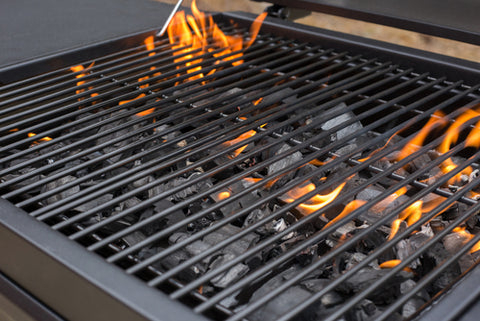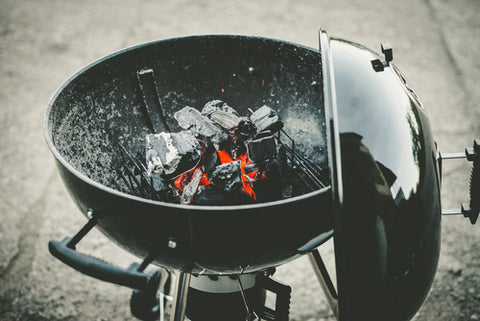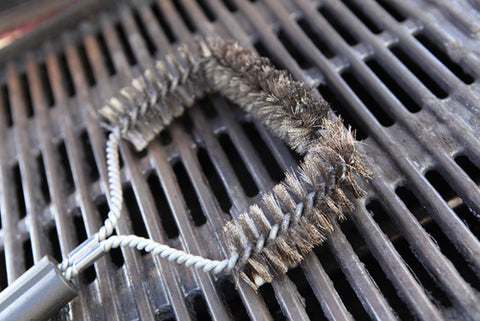It’s the height of summer and grilling season has been underway for at least a couple of months. During that time, hopefully, you’ve had more than your fair share of burgers, steaks, and hot dogs come and go off those grates. And hopefully, you’ve also been keeping up on the care and maintenance of your grill. After all, it doesn’t matter if you prefer charcoal or gas, your grill needs some things to keep it cooking efficiently and safely. If you aren’t sure how you should be doing this, we’re here to help.
Make Your Grill Grate Again

The first thing you should be worried about is your grill grate. Let’s face it. This is where your food spends the most time, and thus, it’s where you should be focused. The best time to clean your grill grate is right before you start cooking but after you’ve lit the fire. The high heat from a fresh bed of coals will help loosen old char and bits of stuck on stuff. Use a grill brush to give the top of the grate a scrub and the fire will get rid of the mess.
Once you’ve given the grate a once over, take a rag or paper towel that’s been dipped in some good vegetable oil and give it a once over. Use a pair of tongs and a grill glove to avoid cooking your hand. Also, only use enough oil to give it a light coat. This way you avoid flare-ups that can ruin a good steak. Pre-oiling your grate will really help make sure that marinated meats and raw veggies aren’t going to stick to the grill, which will also make your next clean up even easier.
Keep in mind that when you’re done cooking, don’t give your grill a scrub. No matter how much it pains you, leave the char on there. That layer of carbon and other bits is actually going to protect the metal against rust and corrosion, which is always a good thing. You can scrub it clear when you’re ready to cook again.
Ashes to Ashes

If you cook with charcoal, at the end of the day you’re going to have a pile of ash in the bottom of your grill. You might be tempted to just leave it in there to form a nice bed for the next pile of charcoal that you use, but don’t.
Spent charcoal ash will suck up moisture like a sponge, and in doing so, hasten the corrosion of your grill’s bottom. Not to mention, as it gets wet, ash becomes almost brick-like and can require a chisel, pry-bar and a miracle to get out once it sets. The easiest way to clean the ash out is to use a short metal scoop, similar to an ice scoop. Once the ash is cool, you can scoop it into a bag or refuse bucket quickly. If you compost, charcoal ash can be added sparingly to your compost pile.
If you use gas, after the cooking is done and the grill has cooled, check your flame tamers. These should be wire brushed clean. Then check the venture tubes of your grill to ensure that there are no clogs, dents, or any other damage that can interfere with the gas flow. Wipe them down so you can make sure that the holes are clear of any debris.
Every month, remove the burners, tubes, and catch basin and give everything a thorough cleaning, removing all large bits and scraps. This will ensure that your gas lines are in positive working order to cook and grill efficiently. If you notice anything that is worn or damaged, replace it.
Keep the Outside Parts Clean and Working

If you are working with charcoal, then all you need to do is inspect the base for rust and give the exterior a good wipe down with a rag and some cleaner. Once you’ve done that, wipe some machine oil on the exposed metal parts (screws, bolts, etc.) The interior should just be wiped with a dry rag, removing any excess bits of food. Don’t scrub it down to the metal. The coating that a charcoal grill gets after a few seasons of use only makes it better.
If you’re cooking with gas, you need to ensure that the lines leading from the tank to the inlet are clean and in good repair. Once a month, do a soap bubble check to make sure that the hardware isn’t leaking. Put a few drops of dish soap in warm water and mix well until it starts to foam a little. Use a paintbrush to brush the mixture onto the connectors and open the gas valves. If you see any bubbles forming, tighten the connection. If that doesn’t stop the bubble formation, you will need to replace the lines.
Make sure that your gas tank is in good repair. Inspect it every time you cook. If you notice any damage to the sides or top, remove it and replace it immediately.
No matter what type of cooking fuel you use, the one thing you should invest in is a grill cover. A cover will protect your grill from rain and the elements, both of which are important. Your grill is, after all, a large chunk of metal that will rust and fall apart if you don’t protect it. Given some proper attention and care, your grill will last, giving you more than a few seasons of delicious grilled meats and veggies.


